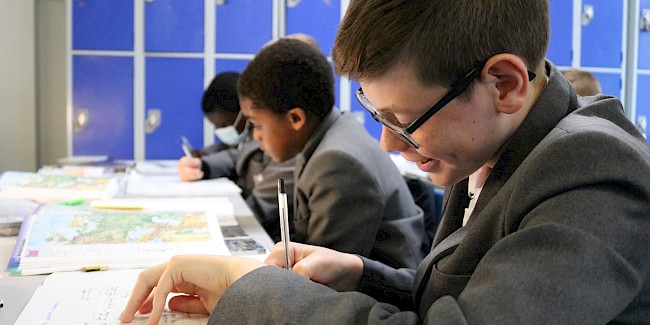
Interested in applying for Sixth Form at Holcombe Grammar School in September 2025?
To apply for a place at our Sixth Form for September 2025, please click here.

To apply for a place at our Sixth Form for September 2025, please click here.

The intent for the Psychology curriculum is to ensure that our young psychologists are equipped with the necessary scientific knowledge, skills and vocabulary to develop a better understanding of themselves and the changing wider world. The Psychology curriculum via the use of the Thinking Schools strategies, will enable our learners to value the importance of Psychological research and will promote an awe-driven curiosity of the human body and mind.
Studying Psychology will give you fundamental and lasting insights into human behaviour; you will learn about the main approaches in this subject (Biological; Cognitive; Social; Developmental and Individual Differences). The research in Psychology ranges from controlled experiments on humans (power of the authority figure to conformity in administering electric shocks) to long term case studies (deprivation studies).
Studies and applications in psychology 1
90 marks
Written paper 1 hour 30 minutes
50% of total GCSE
Studies and applications in psychology 2
90 marks
Written paper 1 hour 30 minutes
50% of total GCSE
| Term 1 | Term 2 | Term 3 | Term 4 | Term 5 | Term 6 |
|---|---|---|---|---|---|
Component 1 - Research Methods and Criminal Psychology | Component 1 – Criminal Psychology and Developmental | Component 1 - Developmental Psychology | Component 1 - Psychological Problems | Component 1 - Psychological Problems
| Component 2 - Memory |
| Term 1 | Term 2 | Term 3 | Term 4 | Term 5 | Term 6 |
|---|---|---|---|---|---|
| Component 2 - Sleep and Dreaming | Component 2 - Sleep and Dreaming | Component 2 - Social influence | Component 2 - Social influence and Research Methods | Revision and Exams | GCSE Exams |
Please see attached Key Stage 4 Learning Journey for Psychology.
The course is 100% externally examined. The course is divided into three components:
Component 1 Research Methods – 30% of the overall course. This component has three elements which include a multi-choice section, stimulus response section and a mathematical data analysis section.
Component 2 Psychological Themes through Core Studies – 35% of the overall course. Students will answer a range of short and essay style question on ten sets of classic and contemporary core studies.
Component 3 Applied psychology – 35% of the overall course. Students answer extended questions relating to three areas of applied psychology, of which, mental health is the compulsory element.
What will you study? | ||
|---|---|---|
| Research Methods | This component introduces the student to the world of research methods whereby, they actively engage in their own practical research investigations. Through the first hand experiences of collecting data via a range of methods and techniques, students will be able to evaluate the strengths and weaknesses of different techniques. | |
| Psychological themes through core studies | This exciting component draws upon classic core studies and contemporary studies, to appreciate how psychological knowledge and understanding has developed over time. There are ten pairs of studies to cover behaviours ranging from child aggression to brain abnormality. Media sources are analysed in detail for their applications and engagement with psychological research. | |
| Applied psychology | This insightful applied unit examines how the research an and theories in psychological theory have an impact on life in certain areas. The compulsory unit is “issues in mental health” plus students learn from two other optional units, choosing from:
| |
| Term 1 | Term 2 | Term 3 | Term 4 | Term 5 | Term 6 |
|---|---|---|---|---|---|
| C1 Research Methods, Experimental. C1 Research Methods, Non – experimental | C2 Biological Approach, Sperry and Casey, C2 Cognitive Psychology, Loftus and Grant. C2 Social Approach, Milgram and Bocchario, C1 and C2 Prelims exam consolidation | C2 Individual Differences, Freud and Baron-Cohen. C2 Section C Applications to Practical Learning Scenarios focus. Developmental Psychology, Bandura and Chaney. C2 Section B Focus Issues and Debates | C2 Biological Approach, Blakemore & Cooper and Maguire. C2 Cognitive Psychology. Moray and Simons & Chabris. C2 Developmental psychology, Kohlberg and Lee. C1 – How Science Works. C2 – Section C Applications of Psychology to real life situations | C2 Individual Differences, Gould and Hancock. C2 and C3 Issues and Debates. C2 Social Psychology, Pilivain and Lee. C2 and C3 The Perspectives (Behaviorism and Psychodynamic) | Prelim preparation. Student responses to prelims Consolidation of Issues, Debates and Approaches |
| Term 1 | Term 2 | Term 3 | Term 4 | Term 5 | Term 6 |
|---|---|---|---|---|---|
| C3 Issues in Mental Health. C3 Criminal Psychology | C3 Issues in Mental Health. C3 Criminal Psychology | C3 Child Psychology or Sports Psychology. C3 -Issues and Debates and applications Synoptic Paper | C3 Child Psychology or Sports Psychology. C3 -Issues and Debates and applications Synoptic Paper | Revisions | Revision |
Please see attached Key Stage 5 Learning Journey for Psychology.
Taking Psychology as an option will change your life. Besides learning about human behaviour, you will also learn how to express yourself coherently, how to challenge information, how to be confident about yourself, how to be a more self-aware person! Progression to University in a wide range of subjects and a variety of careers and professions including the public services, media, human resources, the law, education, research and in the fields of applied Psychology itself. Without a doubt Psychology is relevant to every sphere of industry.
https://www.ucas.com/explore/subjects/psychology
The Holcombe Psychology Department has selected the OCR specification for the inclusive and wide range of applied examples and research which promote respect, mutual understanding and tolerance throughout the two year course. For example in areas of child development, moral development and mental disorders students will learn to learn and reflect in an unbiased way the impact of the situation versus dispositional factors, in behaviours. Additionally, in the study of Forensics students will research and learn about examples of human behaviour in relation to interactions between the morality, rules of law, legal procedures and the criminalisation process. The specification addresses universal issues such as phobias, social influence, classification of intelligence in different parts of the world, looking at themes of universality and cultural practises in society to continue in the contribution of a scientific and academic body of research.
At GCSE level “OCR are enriching and supporting our qualification by working with Time to Change, England’s biggest programme to challenge mental health stigma and discrimination, run by the charities Mind and Rethink Mental Illness” (ocr.org.uk, 2020)
The OCR specification selected has opportunities for the investigation element into the field of psychological sciences researching abnormal and normal behaviours and classifications, in topic areas, demonstrating synoptic skills and critical awareness, learning first hand the challenges of creating universal scientific laws of human behaviour and the challenges in this process.